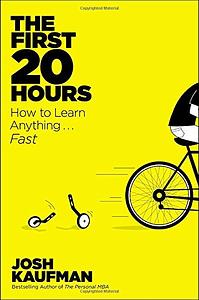You need to sign in or sign up before continuing.
Take a photo of a barcode or cover
This book really let me down, as far as the content goes. The very beginning of the book addresses /how/ to learn new skills, while the rest of book focuses on individual skills, and how to learn them.
A crisp, well-written explanation of rapid skill acquisition that any learning junkie will find incredibly useful.
On the strength of the first three chapters alone, I've been recommending it to anyone who'll listen, but there's a wealth of additional data in the six case studies where the author used himself as guinea pig to test his theories. (They are, in case you've not read it elsewhere yet: yoga; a programming language; a non-QWERTY touch-typing system; an ancient Chinese strategy game called "Go"; the ukulele; and windsurfing.) Where are the likely roadblocks in learning a new language vs. acquiring a new physical skill? How can you use the principles to overcome them? What overarching lessons can you take away from each endeavor you take on?
As a chronic abandoner of projects, I'm delighted to have this book to apply to my next one—either ukulele or sign painting, because (alas), I am told in no uncertain terms that whichever I choose, things will go better if I focus on it wholeheartedly. The good news is that it won't take 10,000 hours to get good enough for either strumming or printing to become enjoyable; if I can discipline myself to do an hour of focused practice each day, I'll have time to get to both, even if it takes me double the 20 hours.
Full disclosure: this review is based on an advance reader's copy of the book, sent by the author, who is a personal friend. That said, I cannot be bought! At least, not for the price of a free book! (Hell, I won't even finish reading a lot of the free books I receive. I mean, have you seen what passes for editing these days?)
On the strength of the first three chapters alone, I've been recommending it to anyone who'll listen, but there's a wealth of additional data in the six case studies where the author used himself as guinea pig to test his theories. (They are, in case you've not read it elsewhere yet: yoga; a programming language; a non-QWERTY touch-typing system; an ancient Chinese strategy game called "Go"; the ukulele; and windsurfing.) Where are the likely roadblocks in learning a new language vs. acquiring a new physical skill? How can you use the principles to overcome them? What overarching lessons can you take away from each endeavor you take on?
As a chronic abandoner of projects, I'm delighted to have this book to apply to my next one—either ukulele or sign painting, because (alas), I am told in no uncertain terms that whichever I choose, things will go better if I focus on it wholeheartedly. The good news is that it won't take 10,000 hours to get good enough for either strumming or printing to become enjoyable; if I can discipline myself to do an hour of focused practice each day, I'll have time to get to both, even if it takes me double the 20 hours.
Full disclosure: this review is based on an advance reader's copy of the book, sent by the author, who is a personal friend. That said, I cannot be bought! At least, not for the price of a free book! (Hell, I won't even finish reading a lot of the free books I receive. I mean, have you seen what passes for editing these days?)
2.4 it was good, but the main ideas of the book is in the first 40 pages max. Rest is just Josh applying the approach to different things.
[a:Josh Kaufman|4409125|Josh Kaufman|https://d202m5krfqbpi5.cloudfront.net/authors/1309447929p2/4409125.jpg] successfully captured my interest and attention in his book [b:The First 20 Hours: How to Learn Anything...Fast|16158493|The First 20 Hours How to Learn Anything...Fast|Josh Kaufman|https://d202m5krfqbpi5.cloudfront.net/books/1364771935s/16158493.jpg|21998909]. Josh is a kindred spirit; we share the same city, we're both active, we're both dads, we have an interest in technology and writing, and we even have like minds when it comes to our hobbies and interests:
I pick up hobbies and interests in the same way as Josh, but sometimes I'd find myself overloaded. I was taking on too much, too fast. For example, last year, I managed to complete my scuba certification, summit about a dozen peaks, hike over 500 miles total, work toward my sky-diving license, and run about 10 km every weekday. It was fun, it was intense, but it was crazy. I crashed hard.
It took a literal bicycle crash to make me realize that I had taken on too much. I was spreading myself thin and not reaching what Josh calls the "target performance level" in many of my interests. I managed to keep my life-priorities always in order, but my hobbies had started to become work.
The First 20 Hours presents some great approaches to "rapid skill acquisition", something I'd always done -- not with intention nor focus. Josh provides a framework that the reader can use to focus in on a skill and reach a desired level of achievement quickly.
I came away from reading the book with a lot of good advice in mind, most especially: "Pick one, and only one, new skill you wish to acquire. Put all of your spare focus and energy into acquiring that skill, and place other skills on temporary hold." If you find yourself interested in picking up a new skill, I encourage you to read Josh's book and give his rapid skill acquisition advice a try. Afterall, "World-class mastery may take ten thousand hours of focused effort, but developing the capacity to perform well enough for your own purposes usually requires far less of an investment."
Personally, I’ve always had a “Renaissance man” sort of temperament: there are hundreds of things I want to learn at any given moment, in hundreds of different areas. -- Josh Kaufman, The First 20 Hours.
I pick up hobbies and interests in the same way as Josh, but sometimes I'd find myself overloaded. I was taking on too much, too fast. For example, last year, I managed to complete my scuba certification, summit about a dozen peaks, hike over 500 miles total, work toward my sky-diving license, and run about 10 km every weekday. It was fun, it was intense, but it was crazy. I crashed hard.
It took a literal bicycle crash to make me realize that I had taken on too much. I was spreading myself thin and not reaching what Josh calls the "target performance level" in many of my interests. I managed to keep my life-priorities always in order, but my hobbies had started to become work.
The First 20 Hours presents some great approaches to "rapid skill acquisition", something I'd always done -- not with intention nor focus. Josh provides a framework that the reader can use to focus in on a skill and reach a desired level of achievement quickly.
I came away from reading the book with a lot of good advice in mind, most especially: "Pick one, and only one, new skill you wish to acquire. Put all of your spare focus and energy into acquiring that skill, and place other skills on temporary hold." If you find yourself interested in picking up a new skill, I encourage you to read Josh's book and give his rapid skill acquisition advice a try. Afterall, "World-class mastery may take ten thousand hours of focused effort, but developing the capacity to perform well enough for your own purposes usually requires far less of an investment."
You could learn everything you needed to know off the first 2-3 chapters. The rest of it is the author going through activities that follow the basic steps but don't really give any insight on anything new. It can get fairly boring and repetitive if you aren't interested in the topics or already have proficient experience in them.
All and all, this could have been a pamphlet rather than a book.
All and all, this could have been a pamphlet rather than a book.
This is a tough one for me to rate - I really wanted more of the actual 'how to' that was outlined in the first couple of chapters. For what I was hoping to get from the book I thought there was too much time spent on the research that was done for each of his projects. That being said, I find Josh Kaufman engaging and so I didnt mind hearing his stories.
It would be interesting to see if these ideas could be put into practice to learn another language.
It has inspired me to learn something new so in that regard it was worth the purchase price.
It would be interesting to see if these ideas could be put into practice to learn another language.
It has inspired me to learn something new so in that regard it was worth the purchase price.
I felt I got what I needed from the start of the book. I may delve back in at another time if I want to read more about the provided examples or am looking for help with something specific.
Maybe a useful tool for organizing yourself when, like me, you have too many hobbies, but not really revolutionary.
Save yourself some time and watch his TED talk instead. Or just read the first three chapters. Unless you're interested in learning yoga, coding, typing in a non-standard keyboard, playing Go, learning the ukulele or windsurfing, you won't get much out of the rest of the book.
informative
inspiring
medium-paced
I really liked the book and I appreciated the examples that Kaufman gave to illustrate his points-- but they were too detailed for my liking. The book could have benefitted from brevity.





